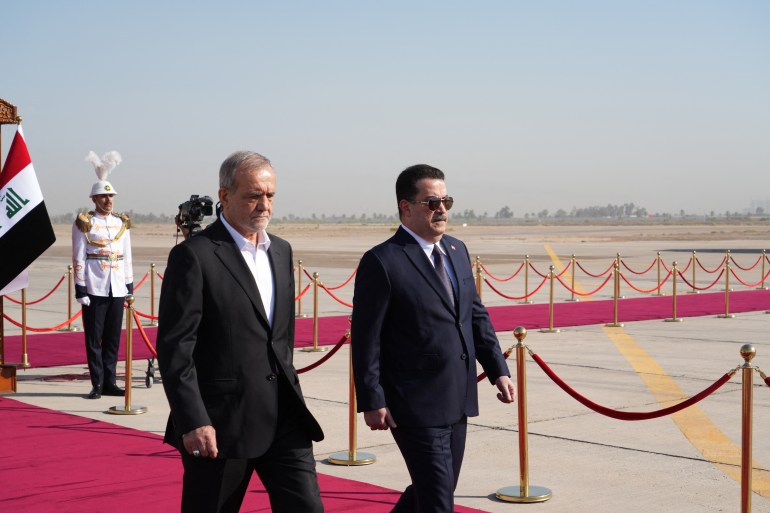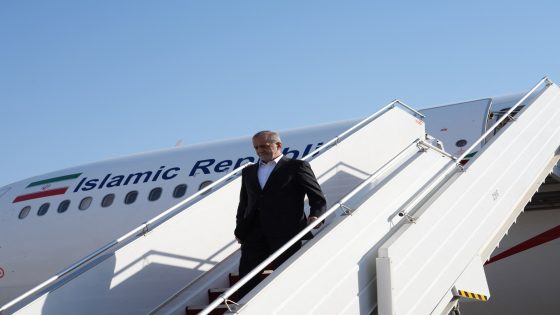Tehran looking to boost trade ties with neighbour amid tightening Western sanctions.
Iran’s President Masoud Pezeshkian has arrived in Iraq on his first state trip abroad, in a bid to boost ties amid tightening Western sanctions.
Pezeshkian, a relative moderate who was elected in July, started his three-day visit as he met Iraqi Prime Minister Shia al-Sudani on Wednesday. During the trip, the president and his delegation are due to sign a number of agreements and discuss the Gaza war and the situation in the Middle East with their Iraqi counterparts, Baghdad said.
The Iranian president visited a monument to Qassem Soleimani, the former head of Iran‘s elite Quds Force – a part of the Islamic Revolutionary Guard Corps (IRGC) – who was killed in a 2020 attack by the United States in Baghdad.

High on Pezeshkian’s agenda will be Israel’s war on Gaza, which has drawn in Iran-backed armed groups around the region and complicated Iraq’s relations with the US.
Expanding trade ties is also one of Pezeshkian’s top goals, said Iraqi political scientist Ali al-Baidar, noting that Iran needs “the Iraqi market for its exports, just as it needs Iraq’s energy imports”.
Pezeshkian will also travel to the Kurdish regional capital, Erbil, for talks with Kurdish officials, according to Iran’s official IRNA news agency.
In March last year, Tehran signed a security agreement with the federal government in Baghdad after launching air raids against bases of Iranian Kurdish rebel groups in the autonomous region.
They have since agreed to disarm the rebels and remove them from border areas.
Absorbing US-led sanctions
During Pezeshkian’s visit, Iran and Iraq expect to sign numerous agreements on trade, agriculture and communications, according to the Iraqi prime minister’s office.
Iranian Foreign Minister Abbas Araghchi said on Wednesday there would be about 15 new memorandums, including ones regarding security and politics.
The planned accords are part a push to shore up Iran’s ties with neighbouring countries to ease the blow of US-led sanctions on its economy.
Iran is one of Iraq’s leading trade partners, with non-oil trade between the two countries at more than $5bn in the past five months, according to Iranian media.
Iran also exports millions of cubic metres of gas a day to Iraq to fuel its power plants under a regularly renewed waiver from US sanctions.
On top of its economic ties, Iran wields considerable political influence in Baghdad, where its Iraqi allies dominate parliament and the current government.
But Iraq also maintains close ties to the US, which still has some 2,500 soldiers in the country as part of an international coalition against ISIL (ISIS).
Hours before Pezeshkian’s arrival, an explosion rocked a base at an airport used by the US-led coalition, Iraqi security officials said.
A spokesperson for the Iranian-backed Hezbollah group in Iraq said Tuesday night’s “attack” aimed to “disrupt the Iranian president’s visit”.
Pezeshkian’s trip also comes as Iran faces new sanctions from the US and several European countries accusing it of supplying Russia with short-range missiles for use against Ukraine.
Iran has suffered years of crippling Western sanctions, especially after the US unilaterally abandoned a landmark nuclear deal between Tehran and major powers in 2018.
Pezeshkian has made the top diplomat who negotiated the 2015 deal, Mohammad Javad Zarif, his vice president for strategic affairs as part of his bid for a more open Iran.





